

Queensland will start 2015 with new legislation that regulates the use of e-cigarettes.
While Twitter declared 2014 the "year of the selfie", the Oxford Dictionary selected "vape" as its 'word of the year' due to the increased popularity of e-cigarettes, as the word describes what smokers of the new product do when they use the nicotine alternative.
The practice has been promoted as a safer alternative to nicotine cigarettes due to the vapour that e-cigarette users consume after a liquid nicotine product—which smells and tastes sweet, and is sold in lolly-like wrappers—is converted by the device.
The global popularity of e-cigarettes has been significant enough for researchers to track their use. In the U.S., the Center for Disease Control (CDC) found that, between 2010 and 2013, the use of e-cigarettes more than doubled among adults.
However, the impact of e-cigarettes upon human health remains under question. After London's Royal College of Physicians published a March 2014 commentary stating that the emissions from e-cigarettes "are much less hazardous" than the smoke from traditional cigarettes, the World Health Organisation (WHO) then reported on "electronic nicotine delivery systems" (ENDS) in August, stating that regulations are required to "prohibit unproven health claims about e-cigarettes". The WHO report also stated that non-smokers and young people need to be deterred from taking up 'vaping'.
Queensland's new laws stipulate the following:
• Use in existing no-smoking indoor and outdoor places is prohibited.
• Children under 18 years of age may not use or purchase e-cigarettes.
• E-cigarettes cannot be advertised, promoted or displayed at retail outlets.
The laws also apply to 'vaping' on the premises of all schools, hospitals and health facilities—including within five metres of their boundaries—while on- the-spot fines of A$230 will be given to offenders.
Heart Foundation Health Director, Rachelle Foreman, praised the Queensland e-cigarette development:
"E-cigarette vapour is drawn deep into the lungs, delivers poisons and chemicals, including toxic metals. Our greatest concern is that e-cigarettes appear to be encouraging the uptake of smoking amongst children and could see another generation addicted to nicotine."
Ms Foreman's statement comes after a one-year-old child died in New York from liquid nicotine poisoning in mid-December. While e-cigarettes are not yet regulated in America, the U.S. Food and Drug Administration is looking into the implementation of federal legislation.